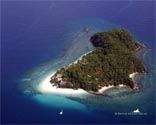Pacific island leaders to gather without Fiji's strongman
 Sydney - Pacific island leaders are gathering in Australia this week to share their despondency over climate change and Fiji's drift from democracy to despotism.
Sydney - Pacific island leaders are gathering in Australia this week to share their despondency over climate change and Fiji's drift from democracy to despotism.
But if the anodyne communiques of previous meetings are anything to go by, those arriving in the far-north city of Cairns for this year's Pacific Islands Forum are likely to leave without an action plan.
At the top of the agenda at the 40th annual meeting of the 16-member group is what to do about Fiji and the refusal of Commodore Frank Bainimarama to deliver on his many promises of a return to democracy since taking control in a 2006 coup.
Fiji was suspended from the forum in May. Bainimarama is not to be in Cairns to mingle with the leaders of the forum's 14 island nations and Australia and New Zealand.
"Pacific leaders should present a united front to make it clear that they will not tolerate human rights abuses in Fiji," said Elaine Pearson, spokeswoman for the New York-based lobbying group Human Rights Watch. "Pacific leaders need to raise this issue with Bainimarama and his government and press him to bring the abuse to a halt."
Papua New Guinea, the Solomons and Vanuatu are pushing for the forum to restore Fiji's membership.
Papua New Guinea Prime Minister Michael Somare, who was leader when his country gained independence from Australia in 1975 and is still its leader today, said on his arrival that finger-wagging had had little effect.
"I think Bainimarama has made up his mind, and he's said this is how he wants to run his place, under the military government, and I think that's the message we've got," the 71-year-old prime minister said. "It may be hard for Australia and New Zealand to accept it, but this is the stand he's taken - nothing much you can do."
And what is true of Bainimarama is true of the forum's strictures on good governance and the need to tackle climate change. Little in the way of action was expected to follow from the wise words in the closing statement.
While there was expected to be consensus on the need to root out corruption and for officials to stop turning a blind eye to illegal logging, seasoned observers of the forum's deliberations do not hold out much hope of talk turning into action.
Papua New Guinea is the key island nation participant because of its size and potential wealth while Somare is the key island nation leader because of his longevity and his combativeness.
His country ranks along with the likes of Somalia and Afghanistan at the bottom of Transparency International's corruption perception index.
Corruption and caring for the environment are sometimes linked. Somare's government stands accused of offering for sale millions of dollars worth of fake carbon credits. Despite the 39 certificates on offer carrying a signature and an official seal, they were described by the head of Papua New Guinea's climate office as "not a false document but a sample."
Australia and New Zealand are to be asked again to pay to keep tropical forests standing. The two rich nations are expected to resist because the trees would be cut down regardless of pledges to spare them from the chainsaw.
"All parts of the country have been considered open to exploitation, even within gazetted nature reserves," Australian National University researcher Phil Shearman said of Papua New Guinea's conservation record. "It won't be long, perhaps in the lifetimes of the country's current leaders, before the ecology of large portions of the country has been degraded permanently."
It is Australian Prime Minister Kevin Rudd's first chance to host the forum, and his particular focus would likely be trying to persuade the smaller island nations to give up their dreams of national airlines, national armies and national currencies.
The programme to break down national barriers is called the Pacific Closer Economic Relations initiative and it is the one area where officials are confident they can make progress.
But even on that front there are problems: Bainimarama wants an end to the notion that the University of the South Pacific in Suva is open to the youth of the region. Fiji's strongman wants it to go back to being just for locals. (d)